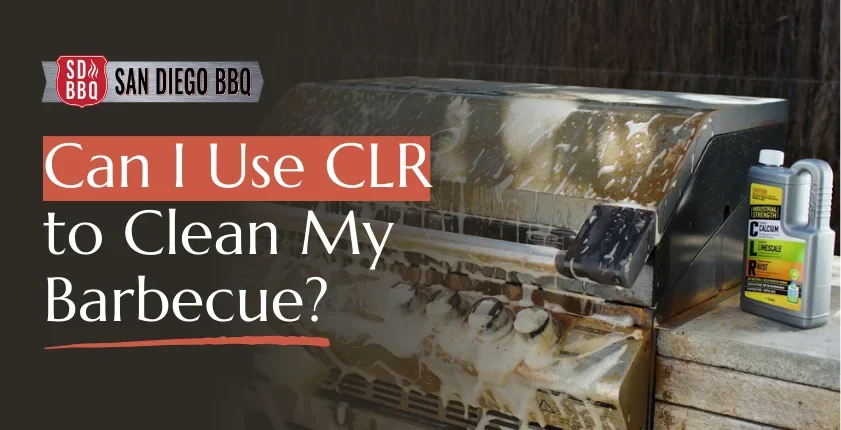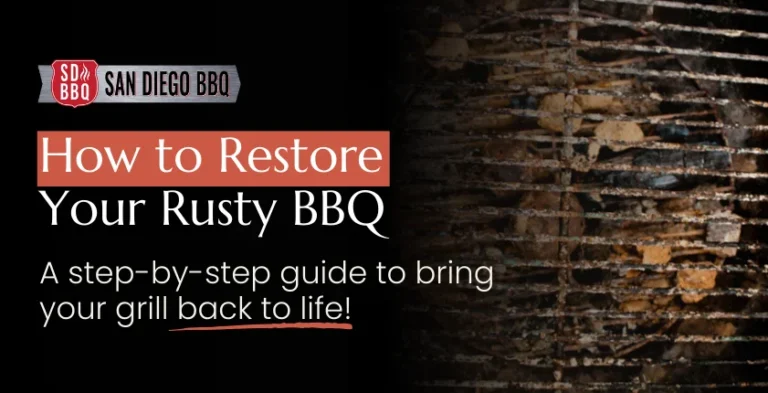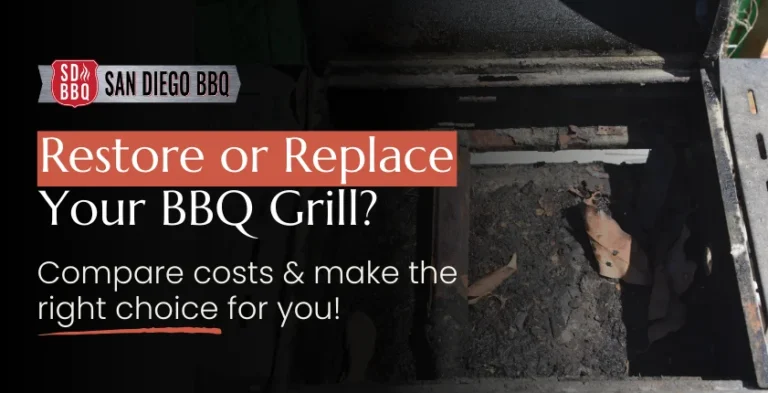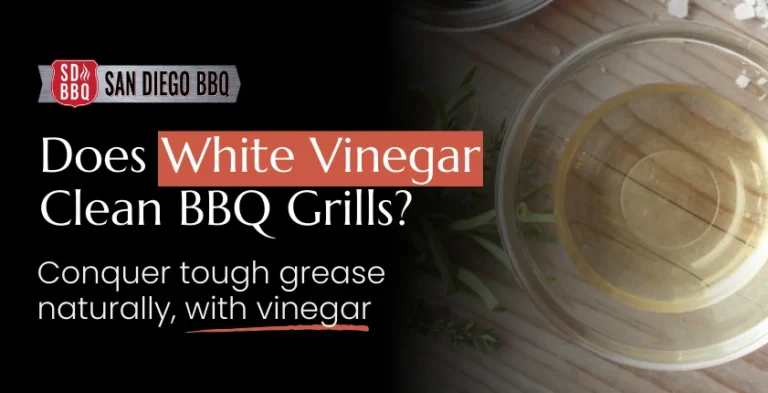You can clean almost anything with CLR, including bathroom fixtures, kitchen appliances, and outdoor areas, but did you know you can use it for regular grill cleaning maintenance?
Calcium Lime Rust, more commonly known as CLR, is a household cleaning product used to dissolve stains, such as calcium, lime, and iron oxide deposits.
CLR can be used to clean hard-to-dissolve bacon grease and tough beef rib grime, but there are specific precautions and steps to keep you safe while destroying burnt food and rust.
Steps for using CLR on your barbecue
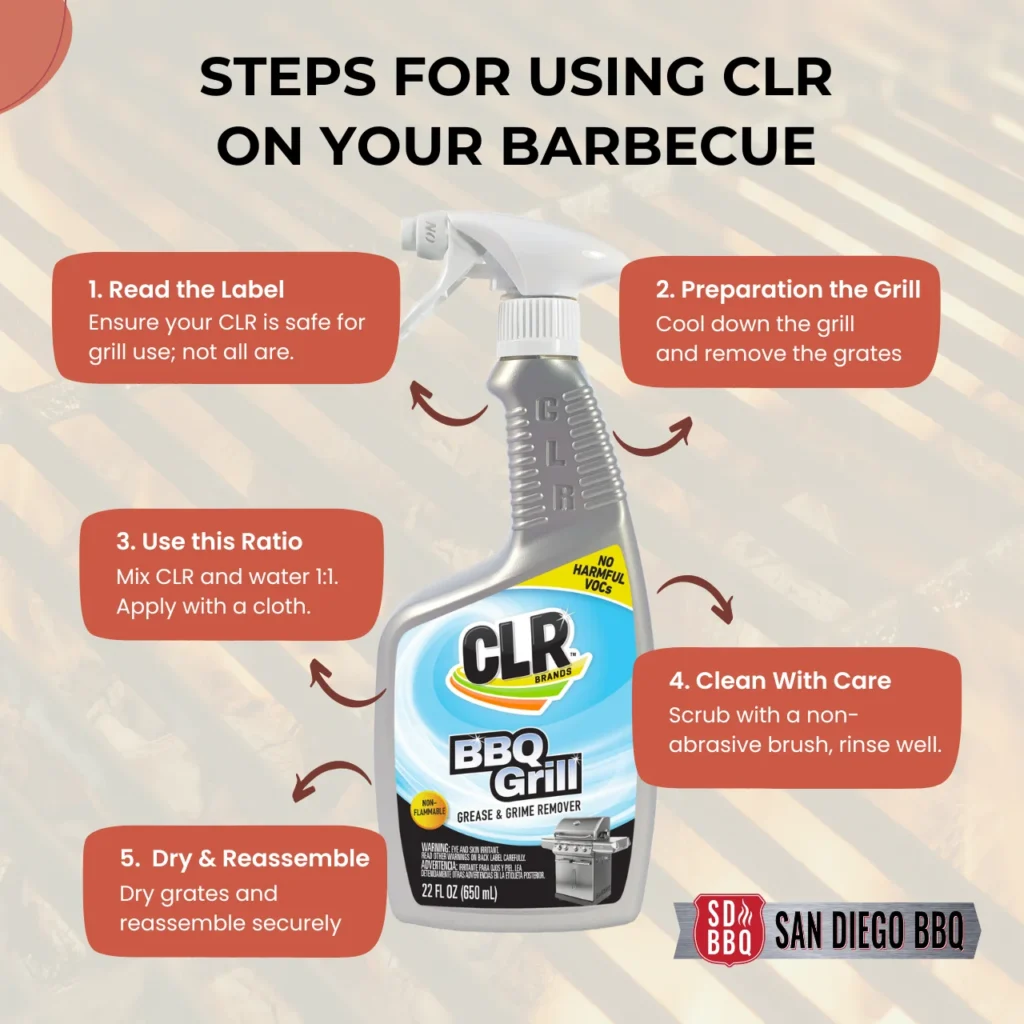
- Read the label: not all CLR products are meant to be used for cooking surfaces, so make sure you have the best CLR for your grill and that you read any warnings or instructions about using it on BBQs.
- Preparation: make sure your barbeque is completely cool, and if it is an electric grill, make sure to unplug it for safe measures. Also, remove the grill grates from the barbeque to make the cleaning process easier and to avoid contact with the heat elements. The food is not the only thing you don’t wanna burn!
- Application: mix a 1:1 ratio of CLR and water. This ratio helps minimize any potential damage. Use a cloth, sponge, or even a brush to apply the CLR solution to the grill grates; avoid applying CLR to the grill’s body, heating elements, or any other components not meant for food contact. Soak the grates in a basin with the CLR solution for tough stains or rust for a couple of minutes.
- Cleaning: use a non-abrasive scrubber or brush to clean the grates, gently scrub to remove grease, rust and lime buildup. Rinse the grill grates thoroughly with plenty of water to remove any residue. This is crucial to ensure no CLR residue remains, which could affect food flavor or safety.
- Dry and reassemble: Dry the grill grates completely before placing them back on the barbecue. Reassemble the barbecue and ensure all components are securely in place.
Additional tips:
- Before applying the solution to the entire grill, test it on a small inconspicuous area.
- Avoid contact with CLR where food is prepared or cooked
- Wear gloves and eye protection to prevent skin or eye irritation
- Work in a ventilated area to avoid inhaling any fumes
Potential dangers:
- Never mix CLR with other chemicals, especially bleach or ammonia, as it can create dangerous fumes.
- Always use CLR according to the manufacturer’s instructions.
- CLR is corrosive and can corrode certain surfaces and materials, such as natural stone, colored grout, aluminum, and some metals.
- CLR is toxic and is harmful if ingested or swallowed. It can cause severe internal irritation and should be treated as a medical emergency.
- Inhaling mist or fumes from CLR can irritate your nose, throat, and lungs.
- Only use CLR in well-ventilated areas
Safety measures:
- Use rubber or latex gloves to protect your skin
- Wear safety goggles to protect or eyes from fumes or splashes
- If you are sensitive to fumes, wear a mask or respirator designed for chemical vapors
- Keep out of reach of kids and pets
- After cleaning with CLR, rinse the area thoroughly to get rid of any residue
First-aid measures
If exposed to CLR, do the following:
- Skin Contact: Remove contaminated clothing and rinse the affected area with water for at least 15 minutes
- Eye Contact: Rinse your eyes for at least 15 minutes and lift your eyelids to ensure a thorough rinsing
- Inhalation: move to fresh air immediately. If symptoms persist, seek medical attention
- Ingestion: do not force vomit; instead, rinse your mouth with water and seek medical attention immediately.
Origin and Development of CLR
Calcium Lime Rust is manufactured by a family-owned company named Jelmar. Jelmar was founded as Manny Gutterman and Associates Inc., named after Manny Gutterman, an entrepreneur who began his sales and marketing career in the 1940s.
The company originally marketed and sold various products, including toys, novelties, and specialty items. Manny’s business and marketing expertise allowed the company to thrive in its early years.
An opportunistic character, Gutterman recognized the need for more effective cleaning solutions in the economy. The company’s first product in the cleaning industry was a line of rust removal products formulated for consumers dealing with common household stains and buildups.
CLR was introduced in the early 1980s and quickly became popular because it could remove tough mineral deposits and stains that no other product could at the time. CLR was also formulated with an emphasis on environmental safety. The product was made with biodegradable ingredients, setting it apart from other harsh chemical cleaners.
The company was eventually renamed Jelmar, LLC to reflect its broader focus on cleaning solutions and establish a distinct brand identity.
CLR Embraces America’s BBQ Legacy
CLR Barbeque Cleaner was first introduced in 2011. It was developed in response to consumer demand for a strong and safe solution for cleaning grills efficiently without using harmful chemicals.
CLR BBQ aligns with Jelmar’s commitment to lowering the company’s environmental footprint. It is non-toxic and free from harsh chemicals like phosphates and ammonia, making it safe for use around children and poochies. In addition to grills, the barbeque cleaner is also effective on a variety of surfaces, including stainless steel, enamel, and porcelain.
Since its launch, CLR Barbeque Cleaner has received positive reviews from customers who appreciate its effectiveness and safe cleaning. Users have noted that it is easy to use and leaves no toxic residue. The product’s success has led to its availability in major retail stores, online platforms, and specialty stores across the United States and Canada.
Jelmar’s journey from a small sales and marketing firm to a leading manufacturer of cleaning products is a testament to the Gutterman family’s commitment to innovation and quality. Through decades of growth and adaptation, Jelmar has maintained its focus on creating effective and environmentally responsible products, ensuring its place as a trusted name in the cleaning industry. Good on you, Mr. Jelmar!
Alternatives to CLR
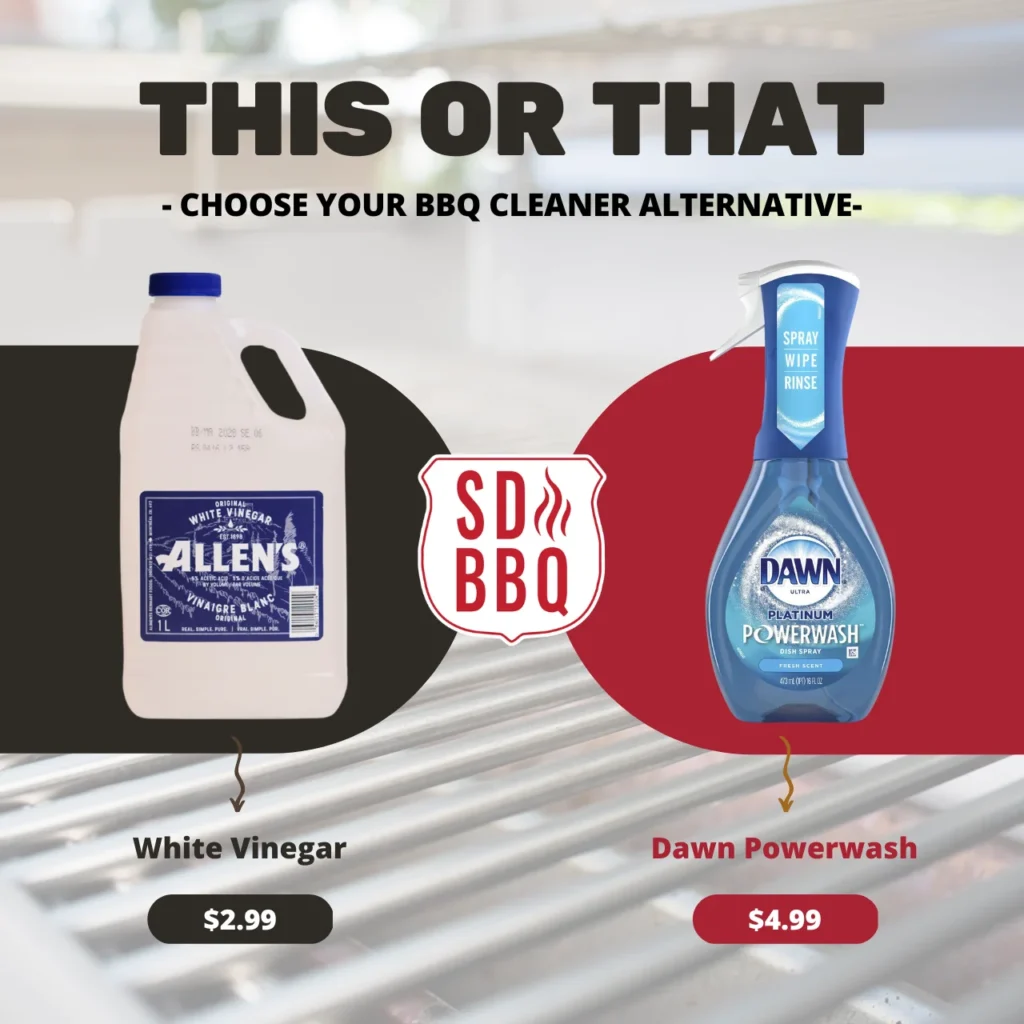
If you’re looking for safer or more natural ways of cleaning your BBQ, then try the following:
- White vinegar: vinegar can effectively clean grill grates without the need for harsh chemicals
- Lemons and salt: cleaning with lemon halves dipped in salt can be a more natural approach for removing rust and stains
If you’re still not completely happy with the cleanliness of your grill, you can attempt to clean your BBQ with WD-40. If that doesn’t do it, you may want to consider a professional bbq grill cleaning service.
Can I really use CLR to clean my grill?
CLR is effective for cleaning and removing mineral deposits but can be dangerous if not used properly.
By understanding the potential risks and taking appropriate safety precautions, you can use CLR safely to clean your barbecue. You should always follow the manufacturer’s guidelines.
If you ever need a deeper clean or don’t want to do the hard work yourself? Well, we’re always happy to help here at San Diego BBQ!


